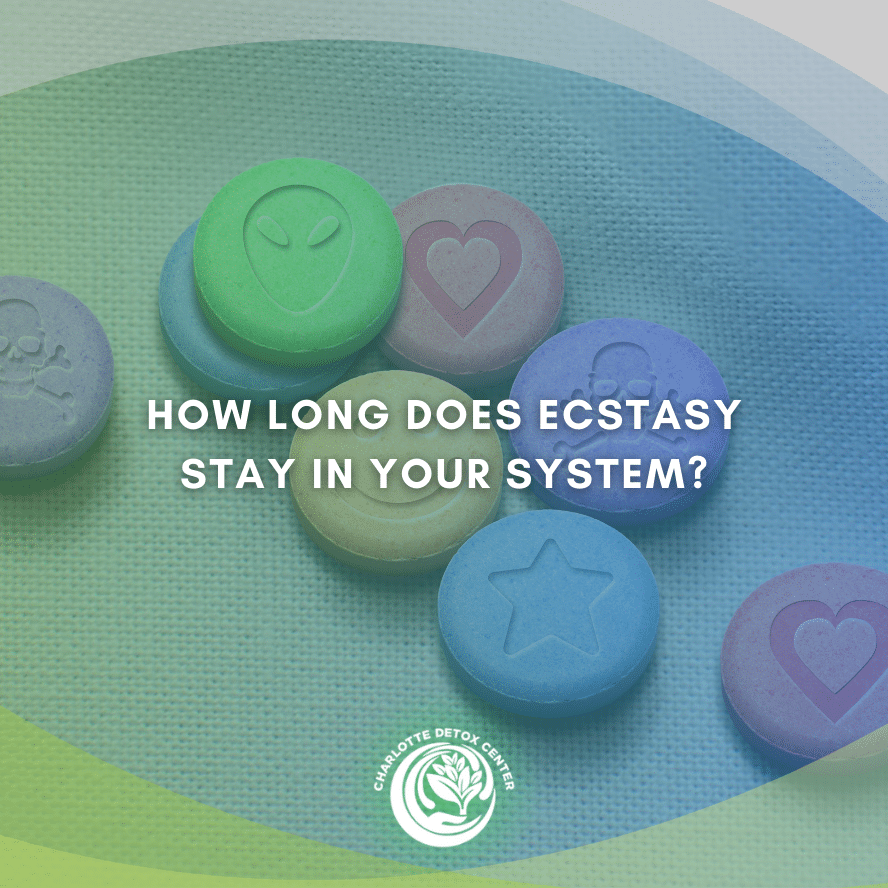How Long Does Ecstasy Stay in Your System?

Medically Verified: 2/1/24
Medical Reviewer
Chief Editor

All of the information on this page has been reviewed and verified by a certified addiction professional.
Ecstasy (MDMA) is a synthetic drug that causes stimulant and hallucinogenic effects. Additionally, MDMA is known to cause extreme feelings of empathy and closeness with others. Because of these effects, ecstasy has become a common drug of abuse in the club and rave scene.
While research is currently underway to determine the efficacy of MDMA in treating anxiety that stems from post-traumatic stress disorder (PTSD), there is currently no medicinal use for the drug.[1] However, ecstasy is known as a common drug of abuse and is a Schedule I controlled substance.
Generally, ecstasy can be found in your system somewhere between 1 to 90 days. The window of detection depends on a variety of factors, including the type of drug test, how often you used the drug, and some of your personal characteristics.
The Effects of Ecstasy
When you consume ecstasy, the high you feel is a result of the way that the drug affects your dopamine, serotonin, and norepinephrine. Those three neurotransmitters are in charge of your mood, energy level, appetite, trust, sexual activity, emotions, and sleep. This is why MDMA is known to cause a wide range of mind-altering effects.
Typically, the effects of ecstasy appear about 30 to 45 minutes after you ingest the drug. The common effects of ecstasy include:[2]
- Euphoria
- Warmth
- Openness and feelings of trust
- Clarity
- Heightened senses of touch, sound, and smell
- Dry mouth
- Jaw or teeth clenching
- Muscle tension or cramping
- Nausea and vomiting
- Sweating
- Blurred vision or sensitivity to light
These effects typically last anywhere from 3 to 6 hours. Some of the physical side effects of ecstasy can persist for 24 hours. However, there are psychological effects that are known to persist for a week after you ingest MDMA.
The persistent psychological effects of MDMA use may include:
- Anxiety
- Depression
- Memory and attention issues
- Decreased appetite
- Decreased libido
- Impulsiveness and aggression
- Trouble sleeping
These issues tend to persist due to a lack of serotonin and dopamine in your brain. To explain, using ecstasy causes your brain to release a large amount of serotonin and dopamine at once. If you take too much or use MDMA frequently, you could deplete your levels of these two neurotransmitters, leading to the abovementioned adverse psychological effects.
Symptoms of an MDMA Overdose
You need to understand how long ecstasy stays in your system. Oftentimes, people who are unaware of this end up taking more MDMA before their previous dose leaves their system. This can lead to an ecstasy overdose.
The symptoms of an ecstasy overdose include:[3]
- Feeling faint
- Increased blood pressure
- Loss of consciousness
- Panic attacks
- Seizures
If you or someone you know displays the signs of an MDMA overdose, emergency medical services must be contacted immediately.
It is important to note that MDMA abuse can disrupt your body’s ability to regulate temperature. This could cause extreme spikes in your body temperature, leading to damage to your heart and kidneys, liver failure, and even your death.
How Long Ecstasy Stays in Your System
The effects of ecstasy last from 3 to 6 hours. However, the half-life of ecstasy is between 8 to 9 hours. In other words, your body will break down all of the active MDMA in your system in 16 to 18 hours.[3]
While MDMA is not included on a standard five-panel drug test, it will show up as an amphetamine. When this happens, the professional administering the drug test will order a confirmation test to determine if MDMA is in your system.
The amount of time that ecstasy is detectable in your system depends on the type of drug test being used.
Blood
Blood tests can detect MDMA in your blood for up to 1 to 2 days after your last dose.
Urine
Urine tests are the most commonly used drug tests because they are reliable, low-cost, and non-invasive. Ecstasy can be detected for 2 to 4 days in your urine.
Hair
Hair follicle drug testing is less common, as these drug tests are expensive and require extensive lab work. However, some employers may use these tests for high-clearance careers. MDMA is detectable in your hair for up to 90 days.
Factors that Affect How Long MDMA is in Your System
An array of factors contribute to how long ecstasy stays in your system. For example, if you snort the drug rather than swallow it, the detection window becomes shorter.
Other factors that affect how long MDMA stays in your system include:
- Dosage
- Frequency of use
- Your BMI and metabolism
- Underlying health issues like liver or kidney disease
- Other substances you take
- Age
- Biological sex
Find Help for Ecstasy Abuse and Addiction
Ecstasy abuse can quickly cause an array of health complications, including high blood pressure, damage to your organs, and death. Because of this, if you or a loved one suffer from MDMA abuse or addiction you must attend medical detox and professional rehab program.
Thankfully, Charlotte Detox Center is here to help you overcome addiction. Contact us today for more information about our world-class drug and alcohol detox programs.
References:
